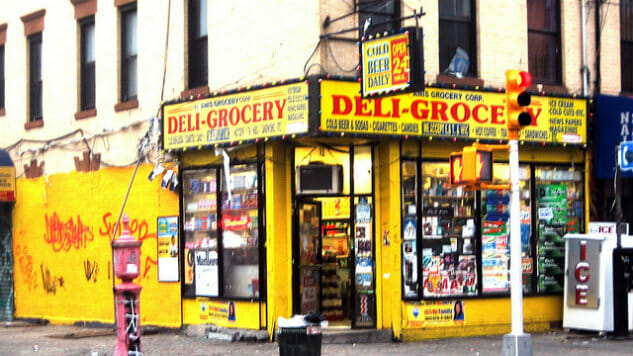Bodegas are the Lifeblood of Brooklyn

Image by Paul Lowry CC BY
Dear Sweet Bodega,
Where would any of us be without you in the depths of Brooklyn at 4:07 a.m.? When we’ve been shoveled from the bar like the last stubborn ice from April sidewalks, and we’re standing around fooling ourselves that we might pass you by without a burger or a BLT, you blaze your head-achingly bright lights from the corner. North Star, beacon of light that smells like bacon — we stumble toward you for salvation.
You’re always at peak bodega after 4:15 a.m. The place is a club, or a hospital; the line is six-deep and the rest stumble around like zombies, absent-mindedly cradling Monster energy drinks, creme sandwich cookies and purple “en fuego” Takis into their arms like sleeping babes.

Image: Spencer Platt / Getty
Half are drunk youngsters bar-departed; half are porters, runners, busboys, dishwashers, and MTA workers. Some workers have just finished their graveyard shift and are grabbing a quick tuck-in to carry home to bed. Everyone in the joint has just finished a cigarette or is asking for matches at the counter.
We know your employees by name; you know us as “bus driver with the same corny joke” or “corporate dude before 7 p.m., crazy dude after 10 p.m.” or “woman with purple hair who shows us cat pictures” or “dad with two kids on scooters.” We listen to you yell out our orders to the cashier, mentioning the extra lettuce and tomato. We laugh at your usual arguments between the deli guy and the cashier, who we learn are cousins once-removed.

Image: Sorbis / Shutterstock.com
A third of the time, your bacon is crisp perfection. A third of the time, it’s just average. A third of the time, it’s shit. You’re always out of bagels by early afternoon. You don’t have anything but rolls at 4 a.m. There’s no 100 percent whole wheat bread, for christ’s sakes, we tell our visiting Californian friend. We’re lucky to get fresh avocado. You have nothing vegan or gluten-free unless it’s packaged and over $7. We don’t care. We still keep coming. We need you in the patches of Brooklyn where there are few restaurants and fewer pharmacies, drugstores or pet stores. In Manhattan, extreme wealth has paved over most of the bodegas, leaving expensive, clean, well-lit greengrocers; they can keep ‘em. You’re the only cost-efficient answer in rapidly-gentrifying neighborhoods where gourmet sandwich shops peddle $12 BLTs.
We’re welcome, as Brooklynites, to stay as long as we want. Want to take two hours to pet the resident bodega cat and christen him with a new name? Be our guest, the lackadaisically sharp owners say with their lack of attention. (And that’s another thing: for those of us who lack pets, your bodega cat not only keeps our food mouse-free, but also is the star of our Instagram accounts. We pet him and long for our pets at our parents’ houses. A casual Instagram viewer would think Churro/ Mouse/ Azucar/ Habibi was our cat, we post about him so much. We love his rusty meow. We know he likes ham more than turkey.)
-

-

-

-

-

-

-

-

-

-

-

-

-

-

-

-

-

-

-

-

-

-

-

-

-

-

-

-

-

-

-

-

-

-

-

-

-

-

-

-












































